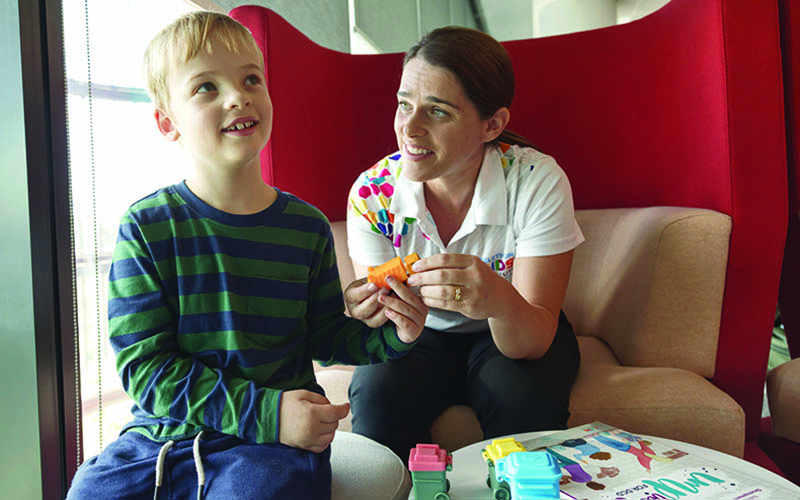
Picutred: Toby with Dr Melissa Licari
Slightly built and knee-high to a grasshopper, seven-year-old Toby doesn’t exactly look like a soldier doing double duty with a 50kg pack strapped to his back.
But with the extra effort he puts in every day just to walk, he may as well be that soldier.
“That’s how much harder he has to work and how much more fatigued he is after, say, walking around the school oval – something so simple for other kids,” Toby’s mum Caroline said. “Even sitting up at school is exhausting for him – just trying to hold that posture while sitting on a chair.”
Toby has developmental coordination disorder (DCD), a neurodevelopmental condition that causes delays and impairments in fine and gross motor skills. DCD affects most aspects of daily living that involve movement, including eating with utensils, drinking from a cup, getting dressed, walking and running, climbing and writing.
Toby, who was diagnosed with DCD at the age of four, struggles with all the above. “His writing is completely illegible because he doesn’t have the coordination to hold his pencil, the strength to form letters or the stamina to keep writing,” Caroline said. “He can read and he’s incredible with numbers, but actually putting it down in writing and demonstrating that knowledge is really hard.”
DCD is estimated to affect one child in every Australian classroom, yet remains poorly recognised among health professionals, teachers and education authorities. Even Caroline, an early childhood teacher trained in special needs, had never heard of it before Toby’s diagnosis.
“I look back on so many children I taught and think ‘That kid definitely had DCD’, yet they were just known as the clumsy kid who fell over when they walked or couldn’t catch the ball,” she said. “I’d just really like to see more awareness in the community, especially among health professionals and schools.”
Big steps to better understanding developmental disorder
It’s more than 20 years since Dr Melissa Licari first began researching Developmental Coordination Disorder (DCD). Sometimes referred to as dyspraxia, DCD is a lifelong neurodevelopmental condition which affects a child’s ability to learn and perform the basic motor skills needed for everyday activities.
Children with DCD are often assumed to be clumsy or lazy and can suffer low self- esteem or anxiety. While the disorder can occur in isolation, it’s common in children with autism and ADHD and children born preterm.
“So many of these kids struggle to keep up in the classroom and playground, and often experience bullying and exclusion by their peers,” Dr Licari said.
“The impact on their lives can be profound.” Despite having been in diagnostic manuals since 1994 and the fact it affects around 5 per cent of Australian children, DCD is one of the most under-recognised neurodevelopmental disorders in Australia – partly thanks to a lack of evidence demonstrating its impact on children and families.
It’s a gap Dr Licari has been steadily filling through dogged, largely unfunded research and advocacy which in the past year has led to a website, comprehensive resources for families, teachers and health professionals, and an international research effort involving thousands of people with DCD across seven countries. Her findings also featured in a submission to the Disability Royal Commission.
Much of this progress has stemmed from Impact for DCD, a national report published by Dr Licari in 2020 on what was then the largest study worldwide aimed at identifying the challenges faced by children with DCD. The report, which presented data on more than 440 children, highlighted the difficulties families experienced in getting a diagnosis and support and revealed there was still no consistent terminology or standardised practice for diagnosis of DCD in Australia. It found families were desperate for Australia- specific resources to help them, educators and medical and allied professionals better identify, understand, and support DCD.
Dr Licari has since worked with families, teachers, clinicians and advocacy group DCD Australia to produce those resources – now freely available on DCD Australia’s new website. Shadow WA Early Childhood Education Minister Donna Faragher has taken up the cause, helping to advocate for the educator-focused resources to become available in WA schools.
Excitingly, the Impact for DCD model has been picked up internationally. “What started as an idea here to raise awareness of DCD and have that first concrete evidence of the massive impact it is having on families, has been noticed by people around the world,” Dr Licari said.
After being contacted by researchers from Canada, the United States, the United Kingdom, Belgium, Finland, Sweden and Germany, Dr Licari shared her survey and helped the international teams modify it for their own contexts.
They are now collecting their respective data and the plan is for them to release their own impact reports, which we’ll eventually pull together to see what we can learn from one another. With all the countries combined, so far we have more than 4,000 children involved – it’s huge.
The model has also been expanded to other neurodevelopmental disorders experiencing similar awareness challenges as DCD, with Dr Licari currently working with the Tourette syndrome community to deliver Australia’s first national survey on Tourette’s and tic- related conditions.
